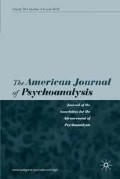Abstract
Otto Rank's approach to psychotherapy, developed after his separation from Freud, encourages living life fully in spite of death and limitation. In his emphasis on the here and now, new experience in the therapeutic relationship, and collaboration and creativity in the therapy process, Rank was ahead of his time. As a theorist of personality and of creativity, his work is well known, but his influence on the practices of humanistic, existential, and post-psychoanalytic relational therapists is largely unacknowledged. Rank's creative legacy is an approach to psychotherapy that calls forth artistry and collaboration between therapist and client.
Similar content being viewed by others
References
Becker, E. (1973). The denial of death. New York: The Free Press.
Cassirer, E. ([1929] 1957). The philosophy of symbolic forms. Volume three: The phenomenology of knowledge [Philosophie der symbolischen Formen. Dritter Teil: Phänomenologie der Erkenntnis], B. Cassirer (Trans.). New Haven, CT: Yale University Press.
Ferenczi, S. & Rank, O. (1924). The development of psychoanalysis. New York: Nervous and Mental Disease Publishing.
Freud, S. (1910). Leonardo da Vinci and a memory of his childhood. Standard Edition (Vol. 11, pp. 59–137). London: Hogarth.
Freud, S. (1912). Recommendations for physicians on the psychoanalytic method of treatment. Standard Edition (Vol. 12, pp. 109–120). London: Hogarth.
Freud, S. (1914a). On the history of the psycho-analytic movement. Standard Edition (Vol. 14, pp. 3–66). London: Hogarth.
Freud, S. (1914b). Recollection, repetition and working through. Standard Edition (Vol. 12, pp. 145–156). London: Hogarth.
Freud, S. (1920). Beyond the pleasure principle. Standard Edition (Vol. 18, pp. 7–64). London: Hogarth.
Gadamer, H. ([1975] 2011). Truth and method (2nd ed.), J. Weinshiemer & D. Marshall (Trans.). London: Continuum International Publishing Group.
Gill, M. (1982). Analysis of transference (Vol. 1). New York: International Universities Press.
Kierkegaard, S. ([1844] 1967). Philosophical fragments or a fragment of philosophy, H. Hong (Trans.). Princeton, NJ: Princeton University Press.
Lieberman, E.J. (1985). Acts of will: The life and work of Otto Rank. New York: The Free Press.
Lieberman, E.J. & Kramer, R. (Eds.) (2012). The letters of Sigmund Freud and Otto Rank: Inside psychoanalysis, G. Richter (Trans.). Baltimore, MD: Johns Hopkins.
Lugrin, Y. (2012). The Rank Ferenczi relationship as seen from France. American Journal of Psychoanalysis, 72 (4), 352–381.
MacKinnon, D.W. (1965). Personality and the realization of creative potential. American Psychologist, 20 (4), 273–281.
Mazlish, B. (1968). Freud and Nietzsche. Psychoanalytic Review, 55 (3), 360–375.
Menaker, E. (1982). Otto Rank: A rediscovered legacy. New York: Columbia University Press.
Menaker, E. (1984). Impressions of the diaries. Columbia Library Columns, 33 (3), 12–20.
Nehamas, A. (1985). Nietzsche: Life as literature. Cambridge: Harvard University Press.
Nietzsche, F. ([1883] 1978). Thus spoke Zarathustra: A book for none and all, W. Kaufmann (Trans.). New York: Penguin Books.
Nin, A. (1966). The diary of Anaïs Nin: Vol. I: 1931–1934. New York: Swallow Press and Harcourt, Brace & World.
O'Dowd, W. (1986). Otto Rank and time-limited psychotherapy. Psychotherapy: Theory, Research, Practice, Training, 23 (1), 140–146.
Progoff, I. (1956). The death and rebirth of psychology. New York: McGraw-Hill.
Rank, O. ([1907] 1980). The artist [Der Künstler]. E. Salomon (Trans.). Journal of the Otto Rank Association, 15 (1), 1–63.
Rank, O. ([1909] 2004). The myth of the birth of the hero: A psychological exploration of myth (2nd ed.), G. Richter & E.J. Lieberman (Trans.). Baltimore, MD: Johns Hopkins.
Rank, O. ([1914] 1971). The double, H. Tucker (Trans.). Chapel Hill, NC: University of North Carolina Press.
Rank, O. ([1924] 1993). The trauma of birth. New York: Dover.
Rank, O. (1929a). Beyond psychoanalysis. Psychoanalytic Review, 16 (1), 1–11.
Rank, O. (1929b). Truth and reality: A history of the human will, J. Taft (Trans.). New York: W. W. Norton, 1978/1936. Translation of Genetsiche Psychologie: Wahrheit und Wirklichkeit. Vol. III. Leipzig and Vienna: Franz Deuticke.
Rank, O. (1929–1931). Will therapy: An analysis of the therapeutic process in terms of relationship, J. Taft (Trans.). New York: W. W. Norton, 1978/1936. Translation of Technik der Psychoanalyse, Vol. II, 1929 and Vol. III, 1931, Technik der Psychoanalyse.
Rank, O. ([1932] 1968). Art and artist: Creative urge and personality development, C.F. Atkinson (Trans.). New York: Knopf.
Rank, O. ([1941] 1958). Beyond psychology. New York: Dover.
Rank, O. (1996). Otto Rank, a psychology of difference: The American lectures, R. Kramer (Ed.). Princeton, NJ: Princeton University Press.
Rieff, P. (1979). Freud: The mind of the moralist. Chicago, IL: University of Chicago Press.
Rudnytsky, P.L. (1984). Rank: Beyond Freud? American Imago, 41 (4), 325–341.
Rudnytsky, P.L. (1987). Freud and Oedipus. New York: Columbia University Press.
Schön, D. (1983). The reflective practitioner: How professionals think in action. London: Temple Smith.
Spitz, E.H. (1989). Conflict and creativity: Reflections on Otto Rank's psychology of art. Journal of Aesthetic Education, 23 (3), 97–109.
Taft, J. ([1933] 1962). The dynamics of therapy in a controlled relationship. New York: Dover.
Wadlington, W.L. (2001). Otto Rank's art. The Humanistic Psychologist, 29 (1–3), 280–311.
Wadlington, W.L. (1983). Otto Rank's art of psychotherapy. Unpublished Doctoral dissertation, Pennsylvania State University, University Park, PA.
Wadlington, W.L. (2005). The birth of tragedy and the trauma of birth. The Humanistic Psychologist, 33 (3), 175–186.
Author information
Authors and Affiliations
Corresponding author
Additional information
1Ph.D., Associate Director, Center for Counseling and Psychological Services, Penn State University.
Rights and permissions
About this article
Cite this article
Wadlington, W. The Art of Living in Otto Rank’s Will Therapy. Am J Psychoanal 72, 382–396 (2012). https://doi.org/10.1057/ajp.2012.25
Published:
Issue Date:
DOI: https://doi.org/10.1057/ajp.2012.25




